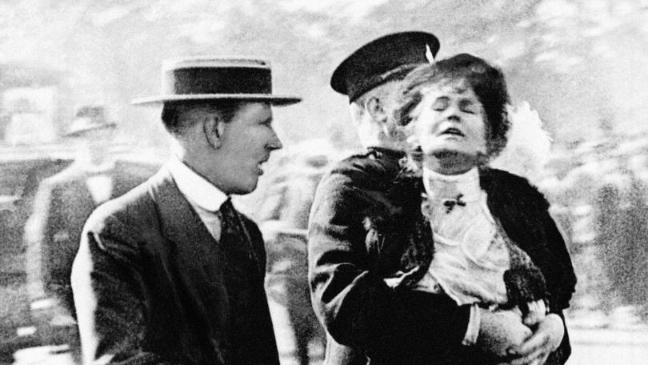The psychology of male domination
Steve Taylor Ph.D.
Even if they belonged to higher social classes, most women throughout history have been enslaved by men. Until recent times, women throughout Europe, Middle East and Asia were unable to have any influence over the political, r eligiousor cultural lives of their societies. They couldn’t own property or inherit land and wealth, and were frequently treated as mere property themselves. In some countries they could be confiscated by money lenders or tax collectors to help settle debts; in ancient Assyria, the punishment for rape was the handing over of the rapist’s wife to the husband of his victim, to use as he desired. Most gruesomely of all, some cultures practised what anthropologists have called ritual widow murder (or ritual widow suicide), when women would be killed (or kill themselves) shortly after the deaths of their husbands. This was common throughout India and China until the twentieth century, and there are still occasional cases nowadays.
Even in the so-called ‘enlightened’ society of ancient Greece — where the concept of democracy supposedly originated — women had no property or political rights, and were forbidden to leave their homes after dark. Similarly, in ancient Rome women unable to take part in social events (except as employed ‘escort girls’) and were only allowed to leave their homes with their husband or a male relative.
In Europe and America (and some other countries) the status of women has risen significantly over the last few decades, but in many parts of the world male domination and oppression continues. In some Middle Eastern countries, for example, women effectively live as prisoners, unable to leave the house except under the guardianship of a male guardian. They have no role at all in determining their own lives; they are seen as nothing more than a commodity, property of the males of the family, and as owners, the men have the right to make decisions for them. Their male owners have the right to have sex with them on demand too. In Egypt, surveys have shown that the vast majority of men and women believe it is acceptable for a man to beat his wife if she refuses sex.
There have been attempts to explain the oppression of women in biological terms. For example, the sociologist Stephen Goldberg suggested that men are naturally more competitive than women because of their high level of testosterone. This makes them aggressive and power-hungry, so that they inevitably take over the high status positions in a society, leaving women to the more subordinate roles.
However, in my view the maltreatment of women has more deep-rooted psychological causes. In my book The Fall(link is external), I suggest that most human beings suffer from an underlying psychological disorder, which I call ‘humania.’ The oppression of women is a symptom of this disorder. It’s one thing to take over the positions of power in a society, but another to seemingly despise women, and inflict so much brutality and degradation on them. What sane species would treat half of its members — and the very half which gives birth to the whole species — with such contempt and injustice? Despite their high level of testosterone, the men of many ancient and indigenous cultures revered women for their life-giving and nurturing role, so why don’t we?

The oppression of women stems largely from men’s desire for power and control. The same need which, throughout history, has driven men to try to conquer and subjugate other groups or nations, and to oppress other classes or groups in their own society, drives them to dominate and oppress women. Since men feel the need to gain as much power and control as they can, they steal away power and control from women. They deny women the right to make decisions so that they can make them for them, leave women unable to direct their own lives so that they can direct their lives for them. Ultimately, they’re trying to increase their sense of significance and status, in an effort to offset the discontent and sense of lack created by humania.
But even this isn’t enough to explain the full terrible saga of man’s inhumanity to woman. Many cultures have had a strong antagonism towards women, viewing them as impure and innately sinful creatures who have been sent by the devil to lead men astray. This view was at the heart of the European witch-killing mania of the 15th to 18th centuries, and has featured strongly in all three Abrahamic religions. As the Jewish Testament of Reuben states:
Women are evil, my children…they use wiles and try to ensnare [man] by their charms…They lay plots in their hearts against men: by the way they adorn themselves they first lead their minds astray, and by a look they instil the poison, and then in the act itself they take them captive…So shun fornication, my children and command your wives and daughters not to adorn their heads and faces.
This is linked to the view — encouraged by religions — that instincts and sensual desires are base and sinful. Men associated themselves with the “purity” of the mind, and women with the “corruption” of the body. Since biological processes like sex, menstruation, breast-feeding and even pregnancy were disgusting, women themselves disgusted them too.
In connection with this, perhaps men have resented the sexual power that women have over them too. Feeling that sex was sinful, they were bound to feel animosity to the women who produced their sexual desires. In addition, women’s sexual power must have affronted their need for control. This meant that they couldn’t have the complete domination over women — and over their own bodies — that they craved. They might be able to force women to cover their bodies and faces and make them live like slaves, but any woman was capable of arousing powerful and uncontrollable sexual impulses inside them at any moment. The last 6000 years of man’s inhumanity to woman can partly be seen as a revenge for this.
We can only be thankful that, in some parts of the world at least, this antagonism — and the oppression that it leads to — has begun to fade away.
Steve Taylor is a lecturer in psychology at Leeds Metropolitan University, UK. He is the author of The Fall(link is external) (from which these piece was extracted) and Back to Sanity: Healing the Madness of the Human Mind(link is external). www.(link is external)stevenmtaylor.co(link is external)m







